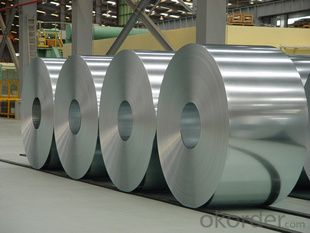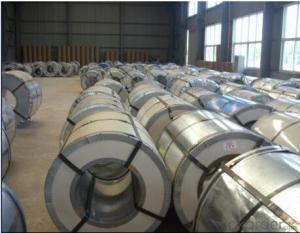High Quality of Galvanized Steel Coil from China
- Loading Port:
- Tianjin
- Payment Terms:
- TT OR LC
- Min Order Qty:
- 50 m.t.
- Supply Capability:
- 10000 m.t./month
OKorder Service Pledge
OKorder Financial Service
You Might Also Like
1. Hot-Dip Galvanized Steel Coil Description:
Hot-dip galvanized steel coil are available with a pure zinc coating through the hot-dip galvanizing process. It offers the economy, strength and formability of steel combined with the corrosion resistance of zinc. The hot-dip process is the process by which steel gets coated in layers of zinc to protect against rust. It is especially useful for countless outdoor and industrial application.
2.Main Features of the Hot-Dip Galvanized Steel Coil:
• Excellent process capability
• Smooth and flat surface
• Workability, durability
• Excellent heat resistance performance
• High strength
• Good formability
• Good visual effect
3.Hot-Dip Galvanized Steel Coil Images

4.Hot-Dip Galvanized Steel Coil Specification
Standard: AISI, ASTM, BS, DIN, GB, JIS
Grade: SPCC, SPCD, Q195, DX51D
Thickness: 0.15-5.0mm
Model Number: coil
Type: Steel Coil
Technique: Cold Rolled
Surface Treatment: Galvanized
Application: Container Plate
Special Use: High-strength Steel Plate
Width: 600-1250mm
Length: depends
commodity: hot dipped galvanized steel coil
technique: cold rolled
thickness: 0.15-5.0mm
width: 600-1500mm
surface treatment: galvanized
zinc coating: 50-275g/m2
coil weight: 3-7 tons
coil ID: 508/610mm
spangle: zero spangle, regular spangle, small spangle, big spangle
payment term: by L/C or T/T
5.FAQ of Hot-Dip Galvanized Steel Coil
What’s the application of this product?
There are many applications for this product. For example, roofing, cladding, decking, tiles, sandwich walls, etc.
What’s the coating composition of Hot-Dip Galvanized Steel Coil?
The coating composition is 55% aluminium in weight ratio, 43.4% zinc, and 1.5% silicon, with excellent corrosion and heat resistance performance.
- Q:How are steel coils used in the manufacturing of construction equipment?
- Steel coils are used in the manufacturing of construction equipment as they serve as a primary raw material for the fabrication of various structural components such as frames, bodies, and chassis. These coils are typically processed through cutting, bending, welding, and shaping techniques to create the necessary parts that provide strength, durability, and stability to construction machinery.
- Q:What is the maximum tension that steel coils can withstand during uncoiling?
- The maximum tension that steel coils can withstand during uncoiling can vary depending on various factors such as the type and grade of steel, the dimensions of the coil, and the uncoiling process. However, steel coils are typically designed to withstand high tension forces, with maximum tensile strengths ranging from 300 to 2,000 megapascals (MPa). It is recommended to consult the manufacturer's specifications or engineering guidelines for precise information regarding the maximum tension limits for a specific steel coil.
- Q:What are the different types of steel coil surface treatments?
- There are several different types of steel coil surface treatments, including hot-dip galvanizing, electro-galvanizing, painting, and powder coating.
- Q:How are steel coils used in the production of oil and gas machinery?
- Steel coils are used in the production of oil and gas machinery as they provide essential structural support and reinforcement. These coils are typically formed into various components such as pipes, tubes, and casings, which are crucial for drilling, extraction, and transportation processes in the oil and gas industry. The strength and durability of steel coils ensure the reliability and longevity of the machinery, allowing for efficient and safe operations in the oil and gas sector.
- Q:what is the densest type of steel ? what is its density ?what is its tensile strength .
- Technically, any metal that is not pure could be considered a steel alloy with the addition of iron. Density will vary depending on the percentage of each alloying element. In commonly available alloys, those with a high percentage of nickel will be the most dense. Nickel has a high molecular weight and readily alloys with most other metals. This class of materials is stainless steels, heat resistant super alloys such as inconel, hastalloy, etc. Tensile strength is not directly related to nickel content. Elements such as boron, manganese, molybdenum, and chromium have the most effect on tensile strength in steel alloys both as rolled and heat treated. Hope that answers your question.
- Q:Are steel coils affected by magnetic fields?
- Yes, steel coils can be affected by magnetic fields. Steel is a ferromagnetic material, which means it can be magnetized and attracted to magnetic fields. When exposed to a magnetic field, the steel coils can have their magnetic properties influenced, leading to changes in their behavior and potentially affecting their performance.
- Q:Consider a steel rod of diameter 4.5 mm and length 3.3 m. If a compressive force of 4900 N is applied to each end, what is the change in the length of the rod?
- You need to calculate the stress on the rod and compare this with the mechanical properties of the steel. It would help if you were given more info. You will need to know something about the steel such as the yeild stress and E, the modulus of elasticity. The value of E is about the same for a wide range of steels. So long as the applied stress is below the yield stress, the strain is all elastic and is calculated from E. The real answer is that you can not answer this question since you do not know what the temperature is. Given the applied load, the change in length will be much different at room temperature than at 1500C.
- Q:I have steel on my 9.5 ti now.. ive heard about synthetic being stronger but it snaps when it hits something sharp.. opinions people?
- I okorder
- Q:my step father bought a big steel drum grill it has steel sheets (very thin) that go inbetween the flame and the food (closer to the flame) with that there the food will not cook, it does not get hot enough????? please help... what should we do
- that steel plate there is to try to keep the grease dripping of the food from making the grill flame up and burning the food. most all quality grills have something similar. you can take the plate out but your going to be prone to flame ups.
- Q:Why people prefer prefabricated buildings these days? Recently my friend has told me that he is going to owe a steel house so I was just thinking are these steel structures really durable and cheaper than concrete structures?
- It really depends upon the environment and the construction techniques used. Steel that is painted or coated will without maintenance eventually rust. I would expect this tendency to be exacerbated in a humid or shore environment. Heat may tend to cook a steel house and the structure does not add much thermal mass. Construction techniques tend to be fairly quick a part of the construction is essentially prefabricated. Work done in a factory will almost always be cheaper than work done in the field, all things being equal. Concrete can be fairly hi tech with lots of equipment or as seen in many parts of the world fairly low tech with lots of laborers. It is easy to change the characteristics of concrete depending upon how it is mixed, reinforced, and treated during the curing process. Because it is applied in a relatively fluid state it can flow around obstructions like bedrock and be formed up into interesting shapes. A concrete structure can be cooler as it provides thermal mass, and a heat sink. It's resulting rigidity may make it more subject to earthquakes than steel. We do really need to be smarter in constructing our homes to make them fit the land and not only the general environment but our particular micro environment.
1. Manufacturer Overview |
|
|---|---|
| Location | |
| Year Established | |
| Annual Output Value | |
| Main Markets | |
| Company Certifications | |
2. Manufacturer Certificates |
|
|---|---|
| a) Certification Name | |
| Range | |
| Reference | |
| Validity Period | |
3. Manufacturer Capability |
|
|---|---|
| a)Trade Capacity | |
| Nearest Port | |
| Export Percentage | |
| No.of Employees in Trade Department | |
| Language Spoken: | |
| b)Factory Information | |
| Factory Size: | |
| No. of Production Lines | |
| Contract Manufacturing | |
| Product Price Range | |
Send your message to us
High Quality of Galvanized Steel Coil from China
- Loading Port:
- Tianjin
- Payment Terms:
- TT OR LC
- Min Order Qty:
- 50 m.t.
- Supply Capability:
- 10000 m.t./month
OKorder Service Pledge
OKorder Financial Service
Similar products
New products
Hot products
Related keywords




























